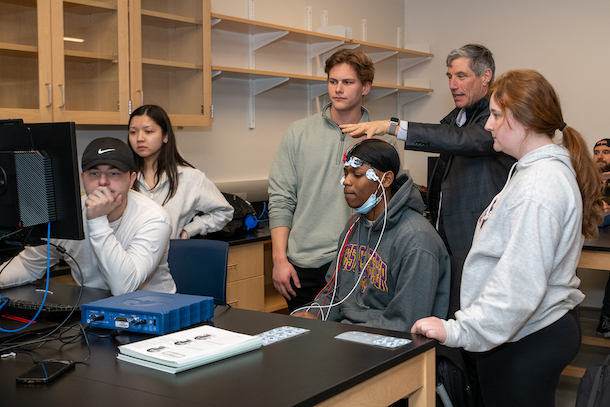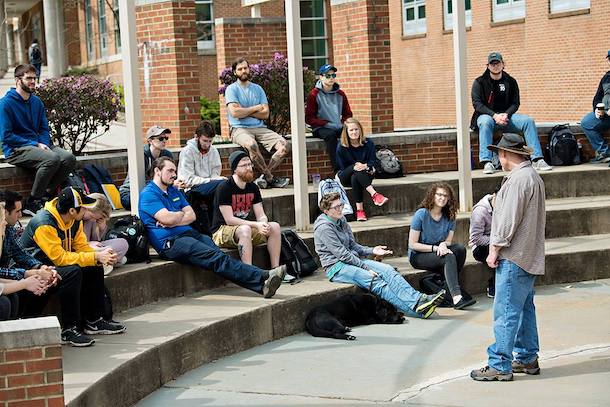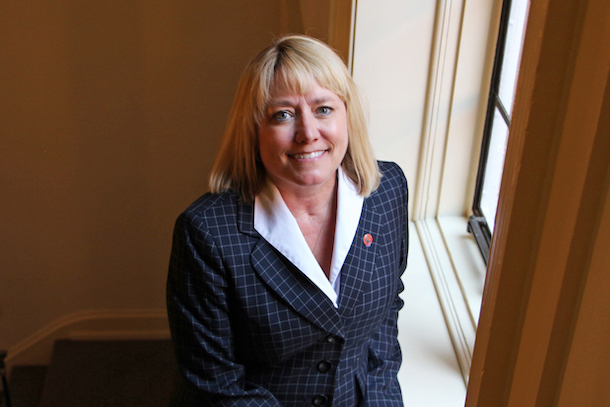Education
The learning curveball: Officials at PASSHE have embarked on a groundbreaking – and fraught – quest to redesign the system.
The State System is hoping lawmakers will approve a historic funding request for the university system this year

Daniel Greenstein has viewed the State System's redesign as long overdue, calling it necessary to keep all 12 schools open and cost effective. Amanda Berg
In the summer of 2021, the Pennsylvania State System of Higher Education – the governing body of Pennsylvania’s 14 state-owned universities – made a decision that would change the course of six of those schools for years to come.
Buffeted by a perfect storm of declining enrollment and the need to align costs with those lower enrollment numbers, the PASSHE board of governors voted unanimously to combine six individual state schools into two new universities – a move that would allow the institutions to share resources while reining in costs at the same time.
It was a historic action for Pennsylvania’s state-owned universities, one intended to chart the State System on a new path to financial stability while simultaneously keeping all of the 14 schools open. While monumental for education in the Keystone State, the move isn’t unprecedented elsewhere. Vermont officials have taken similar steps to merge state colleges, and Connecticut has gotten the go-ahead to consolidate all 12 of its community colleges into one overarching entity.
In Pennsylvania, however, the move was part of a larger effort to reimagine the State System – a process that also includes the approval of new degree programs, the consolidation of services and academic courses across universities and an expansion of online degree programs and other non-degree programs at PASSHE schools.
The redesign of the State System is something that PASSHE Chancellor Dan Greenstein and state lawmakers alike view as long overdue – and necessary to keep each of the 14 state-owned universities open while also ensuring that the system remains affordable and financially sound.
Members of the PASSHE board of governors voted 18-0 last July to merge California University of Pennsylvania, Clarion University and Edinboro University into the new Pennsylvania Western University and consolidate Bloomsburg University, Lock Haven University and Mansfield University into the new Commonwealth University of Pennsylvania.
Under the integration plan, each of the six institutions will remain open as part of two larger university structures that share academic programs, faculty and other resources.

During that July 2021 board of governors meeting, Greenstein made an impassioned plea to board members to integrate the six campuses and move the State System forward.
“Building a reimagined university that blends the talent and the exceptional strengths of three partner campuses in each region is not something that happens overnight. That process will take time; it will be deliberate; it will be inclusive. This is the beginning,” he said. “Through it, we will create two regional powerhouses … participating campuses maintain their historic names, their identities, their sports teams and clubs, while offering their students, their faculty and staff more opportunity than they could afford if they were on their own.”
He added that the integration plan would help improve access to student supports as well as provide better opportunities to connect with potential transfer students at community colleges.
Greenstein, who took over as chancellor in 2018 after a six-year stint overseeing post-secondary education efforts at the Bill and Melinda Gates Foundation, told City & State that he came to PASSHE with two primary goals: ensuring that the system remains financially stable and addressing student needs.
Consolidating resources at the six institutions at the center of the integration plan is one way to control costs for both students and the State System, he said.
Greenstein acknowledged that PASSHE has been grappling with numerous challenges, including underfunding, population decline and price increases. One of his priorities as chancellor has been to ensure students aren’t getting priced out of the market – and, in turn, driven to attend schools outside of Pennsylvania.

In the 2004-2005 academic year, the State System’s total enrollment was 105,902 students across its 14 universities, according to PASSHE data. Enrollment continued to rise over the next few years, peaking at 119,513 in the 2010-2011 academic year. But since that time, enrollment at PASSHE universities has steadily dropped, with just 93,708 students attending state-owned universities in 2020.
Greenstein said the 22% drop in enrollment over that time can be attributed to a number of factors, with affordability chief among them. He said that while PASSHE schools are still among some of the most affordable in the state, costs are still high enough that low- and middle-income students are being priced out of the market.
“At $23,000, $24,000 a year … it represents about 40-plus percent of low- and middle-income families’ household income for one student for one year. I mean, that’s a lot of money,” Greenstein said.
State Sen. Judy Schwank, a member of the board of governors whose Senate district includes Kutztown University of Pennsylvania, told City & State that changes were needed to address funding challenges and better support students.
“What I appreciate most about the system redesign – everybody thinks it is about right-sizing, but I see it more as the focus on what we should have been talking about from the beginning: student success. Every decision that we make has to be linked to: How do we serve our students better?”
PASSHE’s redesign efforts were designed to address a range of issues facing state-owned universities, but the academic overhaul, at times, has faced criticism, particularly from faculty and staff at the universities.

Jamie Martin, president of the Association of Pennsylvania State College and University Faculties, the union that represents PASSHE faculty, told City & State that her members at PennWest and Commonwealth University of Pennsylvania have expressed feelings of exhaustion as they try and expand curricula and academic programs to cover three separate campuses.
“They have to take a look at the curricula that exists in that department in each of those three campuses and try to determine: How do we put this together so that it’s a meaningful experience for our students on all three campuses, with the awareness that we have students on all three campuses that already started the curriculum that was in place” prior to the integration plan,” Martin said.
“I’m just hearing about the level of exhaustion that is there,” Martin said, adding that “a lot of faculty are teaching overloads because they’re not bringing back adjuncts or rehiring for the positions where retirements have occurred.”
Martin also expressed concerns about the potential for the integration plan to increase reliance on online classes, and said that the State System should be transparent about the number of online courses students will have to take at the integrated universities. “To be fair, there are some students who might prefer at least to have some because it gives them some flexibility. But they need to always think of it as truth in advertising. They need to know what they can expect coming in,” Martin said.
Greenstein didn’t discount the criticisms levied by APSCUF and faculty members, noting that PASSHE’s faculty is critical to educating students. “This is a people business, and so your investment in your people is important,” he said, adding that questions, concerns and debate around the system redesign is healthy and necessary. “This is a process where, if everybody was singing merrily along and joining hands, we probably wouldn’t be making the kinds of deep changes that are kind of required.”
But while there are differences of opinion on how best to reorient the State System, there are also clear areas of agreement, especially when it comes to funding. The PASSHE board of governors approved a historic $550 million funding request – and one that exceeds the prior year’s state appropriation by $73 million. Greenstein said the funding would primarily cover operating costs and help the system deal with cost increases driven by inflation.

“It is a number that will offset the inflationary increases. It will enable us to not raise tuition. It will enable us to stop cross-subsidies where universities that are more financially successful are actually giving out money to the universities that are less so – they can’t continue to do that,” he said. “More importantly though, it will enable us to put on a kind of recurrent basis the kind of innovation … that is necessary to evolve in ways that we need to evolve to serve the students that we need to serve better.”
He added that Gov. Tom Wolf’s proposal to provide tuition scholarships for PASSHE students could be one way to attract more students not just to PASSHE schools, but ultimately to the state’s workforce, noting that other incentive programs, like the Public Service Loan Forgiveness Program, have been “incredibly effective.”
Martin concurred that more state funding is crucial to keeping the State System afloat: “A budget will tell you a lot of things – it tells you what you value and what you don’t,” she said. “You can’t cut your way out of these kinds of issues. The only way to do it is to provide adequate funding, and I’m hopeful that that will occur.”
Schwank, who sits on the Senate Appropriations Committee, said state officials can take a number of different actions to attract more students, including by more aggressive marketing campaigns and focusing on individual student stories more. The biggest key to reversing the system’s enrollment trend, she said, is to make each of the system’s 14 universities more accessible. “If students can’t afford us, then they can’t come,” she said. “We’re still a bargain, but when you look at what some private institutions are able to do, in terms of reducing the sticker price for their tuition, we’ve got to compete and, certainly, as a system that’s supposed to serve the state, we have a moral responsibility to make sure that we do that.”
